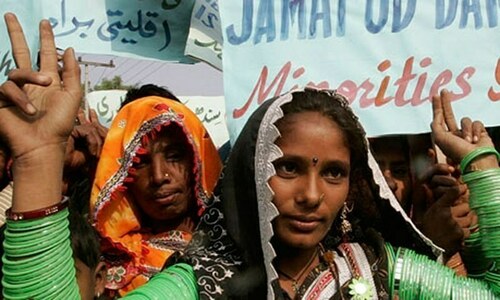THE majoritarian view has once again prevailed in the matter of bringing about legislation against forced conversion in the country. At a meeting on Wednesday of the parliamentary committee concerned, spurious reasoning and outright disinformation was employed to ride roughshod over the fears of non-Muslims for the future of their communities because of what they claim is an increasing incidence of such conversions.
Moreover, it seemed the outcome had already been decided elsewhere. For, when the members demanded a vote on the bill after a heated two-hour debate on its contents, the chairman of the ironically named Parliamentary Committee to Protect Minorities from Forced Conversion in an extraordinary move read out a printed statement that the draft was against the public interest. Consider the institutionalised prejudice that non-Muslims have to contend with in their struggle for a fair hearing on the issue. As mentioned by Human Rights Minister Shireen Mazari herself at the meeting, the Council of Islamic Ideology invited no less than Mian Mithu, the cleric widely accused of being the main perpetrator of forced conversions in Sindh, for a briefing.
Read: Protecting Pakistan's 'other' daughters
Ask the right-wing lobby and they will all largely agree that forced conversions are wrong from a religious point of view. But they refuse to countenance any practical measures that will stop this reprehensible practice. For instance, one of the objections raised is to the stipulation that the conversion statement must be made in front of a magistrate — which would minimise the chance of force being involved. Further, conservative elements base their arguments on a deliberately narrow understanding of the term ‘forced conversion’.
Read: Conversions of Hindu girls in Sindh cannot be considered forced, claims senator
Changing one’s religion voluntarily does not only mean doing so without intimidation and fear of harm; even monetary blandishments are an indirect form of coercion. A voluntary decision to convert is based on an understanding of Islam and an appreciation of the far-reaching consequences such a decision will entail. On it hinge relationships with immediate family, the fate of matrimonial ties, standing within the community, inheritance rights, and so on. That is why there is such opposition in particular to a minimum age for conversion.
Considering there is a minimum age for marriage, there is no substantive argument in opposing one for changing one’s religion — except that young females are the main demographic allegedly singled out for forced conversion. The state’s failure to honestly address an issue that has engendered such insecurity and distress among non-Muslim Pakistanis is shameful.
Published in Dawn, October 15th, 2021












































